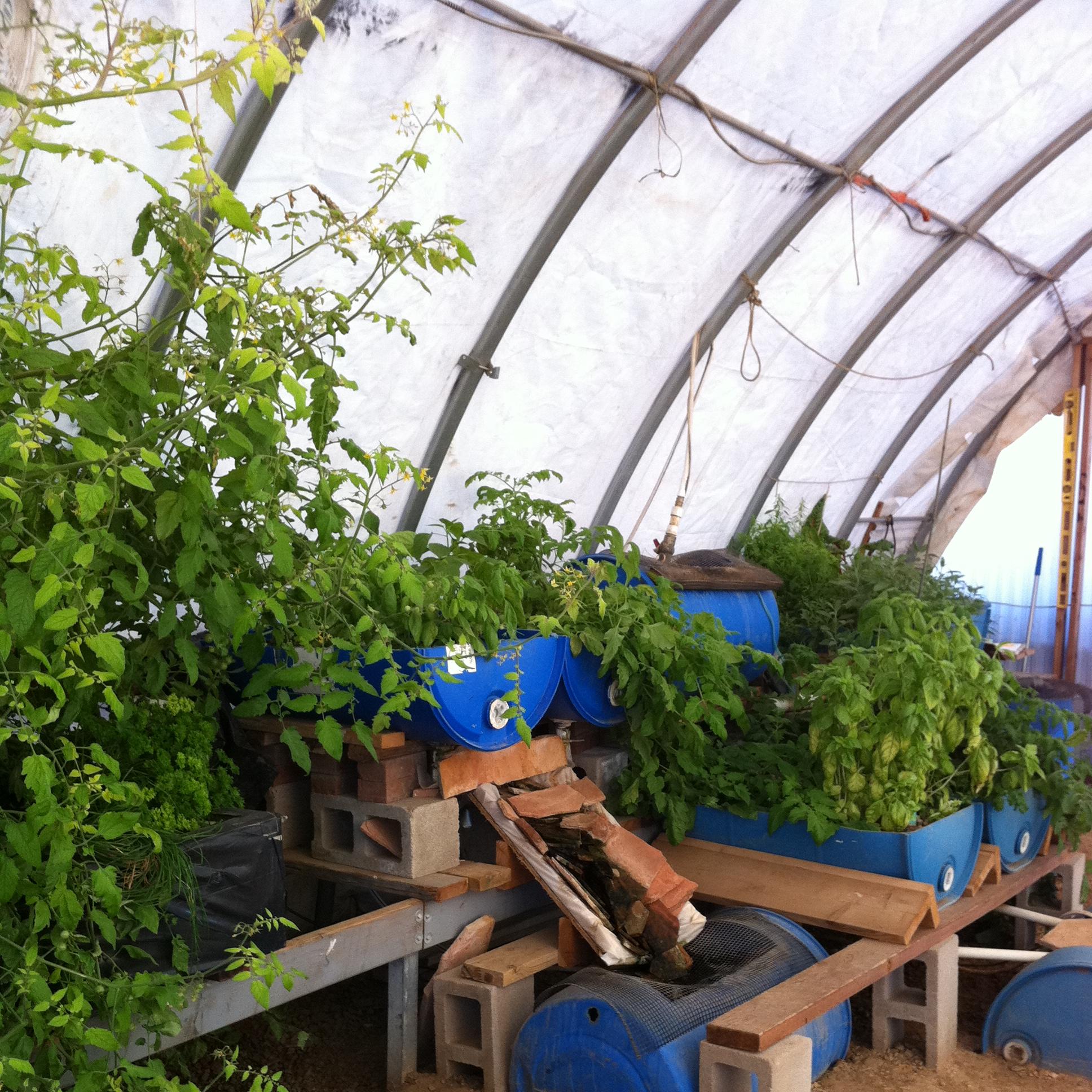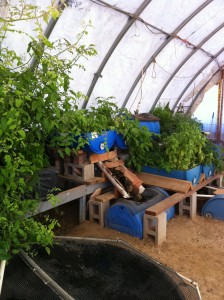We first wrote the article below in 2010, seven years ago. We were just getting started with commercial scale aquaponics as a hands-on research and development project. We are still involved with aquaponics today, but the question raised in this article is still viable today.
CAN COMMERCIAL SCALE AQUAPONICS BE VIABLE?
Please read this short article and then read our comments about the current status at the end of the article. Have Fun!
We are in the midst of a very exciting consulting project, that allows us daily to ask some very hard questions. We are working with our partner Innovaculture to evaluate the feasibility of a sustainable aquaculture project in Alberta, Canada. Right now we are evaluating technologies being used on aquaculture projects around the world to determine which of them might have applicability for our project in Canada. Today, one prominent aquaculture professional asked us a hard but great question – is anyone in the world successfully operating a profitable commercial aquaponics business?
This a great question! If anyone who reads this article knows of this profitable business I think it would be incredibly beneficial for the aquaculture industry in general to know about it. Comment on this article, and pass it on to others that you know that might be able to answer this question.
At this point there is much hype and speculation about financially viable technologies, systems and businesses. Why? What good does it do aquaponics advocates to artificially hype or exaggerate economic FACTS about commercial operations? Business people and investors are smart. Good ones are going to see through over-blown claims. If we as aquaculture professionals want to see our industry grow and sustain, we have to face the reality that often economics is more important than our sacred science (I’m being a bit sarcastic). We have to show profitability to expect to see the financial community show an interest in our industry.
So we have a plan here at WWA and the Institute of Ecolonomics, which is to become the information bank and dissemination source for the economic viability of sustainable aquaculture. We do not have all the details of how we are going to effect this plan, but we are initiating it, and we would like to get your feedback and support for this effort.
We are at a very pivotal time in our history for the tipping point of a sustainable future. What we do now could be more important than anything we can imagine. Lets do a little today, a little tomorrow, and every day thereafter to improve our credibility as a real and viable industry – AQUACULTURE. Please correspond with your thoughts. We will not be offended if you fully disagree with us. healthy dialogue and information sharing on this important topic is vital. Remember todays question – CAN AQUAPONICS BE FINANCIALLY VIABLE?
Well, as we said as we started, the jury is still out about the financial viability of commercial scale aquaponics. However, here is what is not in question – WE HAVE BECOME THE INFORMATION BANK for aquaponics and commercial scale aquaculture. Yes we have! We have formed the Ecolonomic Action Team (EAT) where almost every day we have live teaching and coaching sessions about business ventures that can make the planet better, including aquaculture and aquaponics! It it completely free to join, and you will get higher quality information and teaching than you might ever imagine. Check it out at this Link.
Also, we have just written a new Ebook called “Profitable Backyard Aquaculture”. We would like you to have it as a gift. You can get it FREE by clicking here.
Best wishes to you as you work more and more to “Make some Money Making People and the Planet Better” – Ecolonomics.





http://www.youtube.com/watch?v=W7wqpR8IiFc&feature=youtube_gdata_player
Here are some basic numbers from Murray hallum
The simple answer is no.
Learn details about Aquaponics. Basic to advance
https://farmingmethod.com/aquaponics-description-advantages-disadvantages/
We plan a network of 250+ Urban Aquaponic Farms to be built in urban centers accross America. Let’s consider this. It takes Tilapia six to seven months to reach market size 1.5 lbs. During that time the fish effluent will be used to produce, for example, seven crops of lettuce (approx. one every thirty days) Meanshile the fish have eliminated he cost of commercial fertilizer, cut the carbon cost of trasnsport, saved millions of gallons of fresh water (as aquaponics filters, bio-digests, and reuses almost all of the water. One could, for example just keep the fish for fertilizer … selling them is a bonus.
See our blog for more information and data at: familyfishfarms.blogspot.com
I have been researching and evolving my aquaponic system for several winters (when I have free time). I need to prove to myself and the my bank that $150,000 investment can make us a living. The specific yeilds and market price for Wi. is difficult to quantify. If you can help in any way with solid numbers of markets or how to better understand them would be fantastic
hi,
Thanks for a great initiative.
It amazes me how much potential this industry has yet, untapped. Possibly due to good ol politics.
However, from a business point of view, Non Centralization is key to any business success.
I am testing a small project and plan to scale nationwide, strategically.
I will add more comments as i progress.
thanks again
Al
I wish it was as simple as saying yes or no. And it would be great to be in a region of the world where we could say aquaponics is profitable. I do not believe aquaponics in its purest form is profitable in North America but it is sustainable.
Only with more expensive crops. I believe Chinese race paddy fields use an aquaphonics on a grand scale.
At this point, there is much hype and speculation about financially viable technologies, systems, and businesses. Why? What good does it do aquaponics advocates to artificially hype or exaggerate economic FACTS about commercial operations?
Fish Hatchery for sale!!!! http://Www.sunbubble.net
Information about Aquaponics is there! It is financially viable and requires small cost and less water. There is a growing hunger in Asian countries. Especially in South Asia. At this moment of time, when less agricultural land is available for growing food. Genetically modified crops are available, we can grow our own food using Aquaponic/hydroponics.
Am an aquaponics system installer and manufacturer in Kenya. See http://www.asarafrica.com .What if we broke down our question into four and ask:-
1.Is RAS profitable?
2.Is hydroponics profitable?
3.At what scale?
4.If RAS blends with hydroponics to aquaponics and raise capital investment what’s the ROI